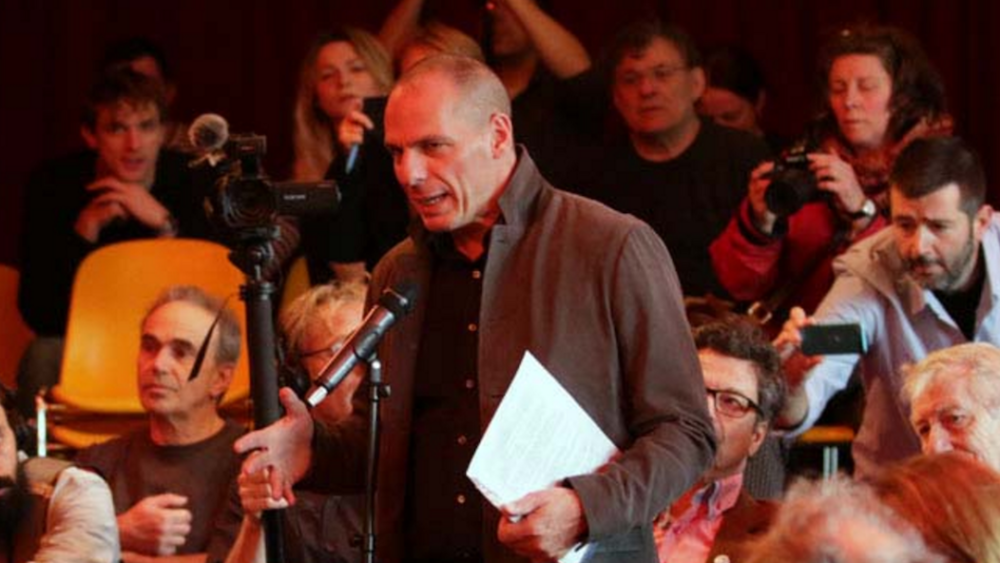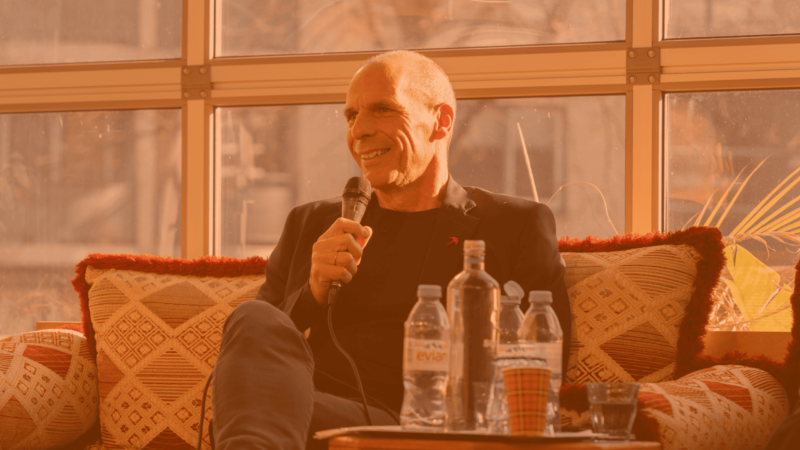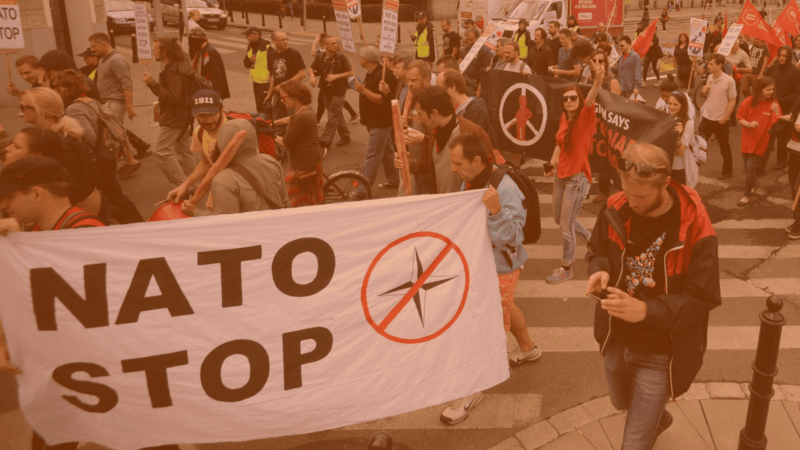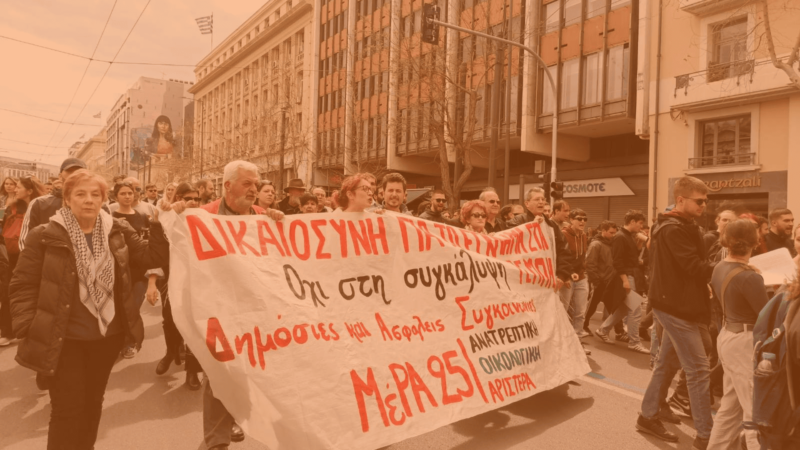By Yanis Varoufakis and Lorenzo Marsili. Originally published in Italian in Repubblica
A year ago, the OXI vote in Greece was a thumping NO to an authoritarian, austerian, troika-controlled EU and a majestic YES to a democratic Europe. This message is more relevant today than ever.
Since last summer, the crushing of the Greeks’ OXI reinforced the centrifugal forces that are tearing Europe apart and begat the awful EU-Turkey treaty on refugees that sacrificed also Europe’s soul to the alter of xenophobia. Brexit was a natural repercussion, one of many to come. Once on this slippery slope, Europe is sliding fast into a vicious cycle of authoritarianism, self-defeating austerity, debt-deflation, xenophobia and banking troubles (due to Europe’s proclamation of a banking union that violates the meaning of the term).
Sticking to the existing ‘rules’ is impossible without losing the dream of a borderless, transnational, democratic Europe. And losing this dream of Europe means another slide, this time at the level of the nation-state, to a form of nativism that appeals to sovereignty but promotes economic developments that stymie democracy. Matteo Renzi is, therefore, right to protest ‘rules’ that are detrimental both to the Italian nation-state and to the European Union. But he is wrong not to use the power of his office to call for a EU Summit that debates, and re-designs, these unenforceable, self-destructive ‘rules’.
As evidenced by Brexit and recent opinion polls, it is no longer self-evident to large sections of the Right and the Left that the dissolution of the EU is worse than its continuation on a business-as-usual basis. The status quo is increasingly unloved and unstable both on the xenophobic Right and on a Left keen to return to the bosom of the nation-state in the hope of restoring a progressive agenda on the foundation of retrieved national sovereignty. This coalescence of anti-EU narratives from both the Right and Left is the projection of an undercurrent of the EU’s economic and legitimacy crisis on the canvass of visible politics.
Stefano Fassina has recently written in Il Manifesto that all demands to democratise the EU are vain and rhetorical. That no European demos exists, but only national demoi with their separate languages, cultures and social conventions that provide the basis for common political projects. Coming from the Left, his argument represents a worrying moment for the Italian Left. Come to think of it, the argument that the nation-state and the demos are mapped one-to-one (one nation, one language, one culture, one Parliament, one currency) has traditionally been the argument of Burkean Tories in Britain, with echoes also of Le Pen in France. It is a sad day (revealing of the damage that the EU’s failures have inflicted on, amongst others, Europe’s progressive politics) when the Left turns its back on its instinctive internationalism to adopt a nationalist, an essentialist outlook.
The problem with Fassina’s argument is the gross misconception at its heart concerning what constitutes a people. The essentialist conception of a single, national demos has always been a tool of the establishment, and of the far right, to gloss over the multiple layers of class struggle and to suppress dissent by pitying the ‘nation’ against the ‘other’ – with which, the argument goes, it is impossible to share sovereignty, decision making, a Parliament etc. Has the Left forgotten Antonio Gramsci’s fine point that a demos (popolo) does not pre-exist its own political mobilisation, and that a people emerges through joint struggles? Is Fassina telling us that the Italian precarious youth cannot form a coalition with German mini-jobbers against, say, the tax evading elites of all EU states? Is he happy to dismiss the fact that there is more commonality between the thousands of volunteers who help refugees in Italy and Austria than there is between them and Matteo Salvini and Norbert Hofer? The task of ambitious politics is to make call for precisely these alliances to act as the foundation of the Left’s mobilization. To deny the very possibility of common, pan-European mobilization that shapes a cross-border, multi-ethnic demos, is to deny the Left’s raison d’ etre. And to deny the Left’s raison d’ etre, in the name of the… Left, is to slide surreptitiously into the trap of a nationalism within which no left wing, progressive politics can breathe.
Ours is, of course, not an argument for prioritizing the European over the national level. It is, simply, an argument for not prioritizing the national over the European level and it is, most certainly, a Left argument in favour of a strategy for the EU of IN and AGAINST – a political campaign of staying IN the EU in order to struggle against its institutionalized authoritarianism. Nation-state-based politics is crucial, just like municipal politics is. But to retreat into nationalist positions, such as Fassina’s, is to throw in the towel in the two-pronged struggle against the nationalist Right and the trans-national Brussels-Frankfurt establishment that is responsible for the EU’s fragmentation.
To combine democratic sovereignty in our cities, our national parliaments and beyond, we need a pan-European movement with the force to organise, mobilise and galvanise across Europe, with an array of actions ranging from civil disobedience to good lobbying, and with a focus on all those Europeans – a majority – who feel represented neither by the status quo nor by nationalists. Sovereignty at home, at the level of our cities and our countries, can only be achieved through struggles that are forging the European demos that, once forged, will demand a pan-European democratic, federal constitution.
It was under a moment of crisis greater than today’s that Altiero Spinelli, in 1942, confined by the fascist regime in the island of Ventotene, first outlined the vision for a united Europe based on transnational democracy and social justice. Today, Italy’s progressives need to recover their spirit and the confidence that our continent can be saved from a new 1930s through a pan-European democratic struggle.
Lorenzo Marsili and Yanis Varoufakis are co-founders of DiEM25 – the Democracy in Europe Movement
Do you want to be informed of DiEM25's actions? Sign up here















